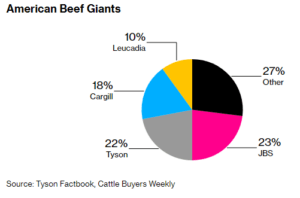
A cyberattack on JBS SA, the largest meat producer globally, forced the shutdown of all its U.S. beef plants, wiping out the output from facilities that supply almost a quarter of American supplies.
According to an official with the United Food and Commercial Workers, all of the company’s fed-beef and regional beef plants had to shutter. All other JBS meatpacking facilities in the country experienced some level of disruption to operations International Union.
JBS didn’t immediately respond to a request for comment. The union represents workers at the company’s plants in the U.S.
Global Consequences of the Hack
According to a trade group, Slaughter operations across Australia were also down, and the cyberattack idled one of Canada’s largest beef plants. That comes after a weekend attack on the Brazilian company’s computer networks, according to JBS posts on Facebook, labor unions, and employees.
It’s unclear exactly how many plants globally have been affected by the ransomware attack, as Sao Paulo-based JBS has yet to release those details. The prospect of more extensive shutdowns worldwide is already upending agricultural markets and raising concerns about food security as hackers increasingly target critical infrastructure. Livestock futures slumped while pork prices rose.
The Rise of Large-Scale Cyberattacks
Hackers now have the commodities industry in their crosshairs, with the JBS attack coming just three weeks after Colonial Pipeline Co., operator of the biggest U.S. gasoline pipeline, was targeted in a ransomware attack. It also happened as the global meat industry battles lingering Covid-19 absenteeism after recovering from outbreaks last year that saw plants shut and supplies disrupted.
The White House offered assistance to JBS after the company notified the Biden administration on Sunday of a cyberattack from a criminal organization likely based in Russia, White House Deputy Press Secretary Karine Jean-Pierre told reporters Tuesday.
The Threat of Ransomware
More than 40 publicly reported ransomware attacks against food companies since May 2020, said Allan Liska, senior security architect at cybersecurity analytics firm Recorded Future.
JBS suspended North American and Australian computer systems on Sunday after an organized assault on some of its servers, the company said in a Monday statement. Without commenting on plant operations, JBS said the incident might delay certain transactions with customers and suppliers.
“Retailers and beef processors are coming from a long weekend and need to catch up with orders,” Steiner Consulting Group said in its Daily Livestock Report. “If they suddenly get a call saying that product may not deliver tomorrow or this week, it will create very significant challenges in keeping plants in operation, and the retail case stocked up.”
The Identity of the Hackers
The FBI has said that cybercriminal group REvil (also known as Sodinokibi) was behind the recent attack on meat supplier JBS. This development follows a statement from White House deputy press secretary Karine Jean-Pierre, which indicated that the attack likely came from a Russian-based organization.
REvil has previously been implicated in the recent Apple and Acer ransomware attacks and last year’s Travelex attack.
(Original Source: Bloomberg News, TheVerge)



